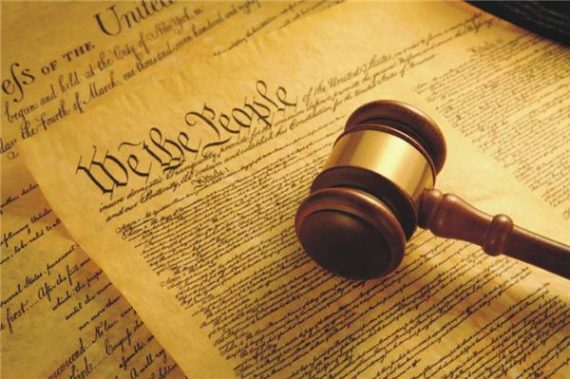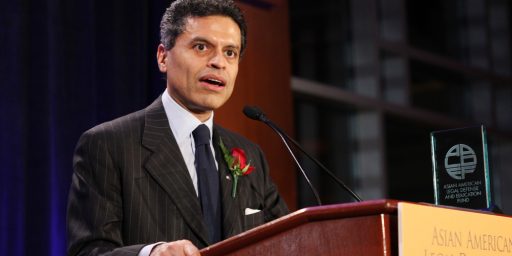Debating the Constitution
220 years in, we lack basic agreement about what the United States Constitution does
A very interesting discussion on the Constitution on yesterday’s “This Week” roundtable between George Will, Georgetown’s Michael Eric Dyson, Harvard’s Jill Lepore, and TIME editor-in-chief Richard Stengel. It’s in two parts, which I’ve embedded below.
Constitution Politics
Battle for the Constitution:
While the “living Constitution” vs. “intent of the Framers” discussion has long since gotten annoying in the abstract–that it’s a framework, at least some of which is subject to interpretation should be beyond question at this point–the starkness of it on display here is stunning. George Will, alone among the panelists, takes the view that, by its very definition, a constitution has to be limiting. Both Dyson and Stengel take the view that whatever the parliament wills is the law, subject only to the wishes of the Supreme Court. If that’s the case, then why have a Constitution at all?
Defending the rather silly notion that Barack Obama has singlehandedly overturned the concept of “a government of limited, delegated, and enumerated powers” asks the question whether, given that obesity is a national problem with an impact on interstate commerce, can Congress constitutionally require overweight Americans to join Weight Watchers. Both Dyson and Stengel think the question is absurd; of course they can. (Lepore, frankly, seems to be having her own debate and makes no memorable contribution to the discussion.)
The fact that unconstitutional laws are sometimes passed and that we rely on the Supreme Court to overturn them does not render the Constitution moot. It simply means that it’s a document governing human beings and which relies on human beings to carry it out. There are bedrock principles that are supposed to govern our political life. There is conflict over how these principles apply to modern circumstances and what to do when multiple principles collide; that doesn’t mean there are no principles.
Dyson, who apparently believes gratuitous use of highfalutin language makes him sound more scholarly, repeatedly makes the point that the Constitution has evolved with respect to the treatment of racial minorities and women. He thinks this proves his point. In reality, actual amendments to the Constitution (notably the 13th, 14th, 15th, 19th, and 24) and using the frameworks outlined therein did most of the heavy lifting.






I’m just glad that someone at ABC News had the good sense to know that their viewers are too stupid to know the meaning of the word “perspicacious,” and too lazy to look it up.
Re:
This! [at least the description]…
Who is the intended audience for these discussions? Other Inside the Beltway persons, new voters, independent voters, a self-sustaining political commentator web of persons who commentate on commentary, who?
The complicated answers to simple questions has to be simplified so that the majority of persons in the audience understand what the person is trying to say, and yet be challenged somewhat to learn more….so: fed, but not spoon-fed….
But this guy…I didn’t know what he was trying to say half the time. I couldn’t tell if he was full of himself, or insecure and over-compensating, or just deaf to his own voice….
@Robert in SF: I’m a PhD social scientist and know most of the vocabulary but felt myself translating into English. And I’m frankly not sure the words meant what he thinks they did half the time.
@James Joyner: I am a political novice, in some ways, with passion and education about some subjects, ignorance and curiosity about others, and willing apathy for the rest….and I feel like the political discussions and debate sometimes are more about showing off than in communicating ideas.
I wish there was a show or blog that was built for new voters (18 year olds, new citizens, etc.) that would start educating those persons about the various hot-button issues coming up in the news, with a historical summary to date, and a point/counterpoint technique for helping a person understand the issues, what each of the many sides believes, and where to go to get more detailed info….
But alas, it’s not to be…
@Robert in SF: that would require an objective, non-partisan source to create something like that. Good luck finding someone who qualifies.
@Boyd: I don’t actually think an objective, non-partisan source would help either. A lot of political differences come from first principles of interpretation, which will always be in conflict. For example, what one person says is an industry-destroying regulation that should not be promulgated because it would violate private actors’ property rights, another says will encourage competition with sheltered incumbent business interests and internalize the externalities of one’s actions. I’m not sure how you can get around this problem, other than by reading widely and thoughtfully. It doesn’t help, of course, that many times politicians won’t say their true motivations are behind their actions.
How appropriate that the Brits have just unveilled a statue of President Reagan.
The most pernicious thinking about the Constitution today isn’t from folks like Will, Dyson or Stengel. It’s from folks like Mark Levin who contend the Constitution simply validates whatever policies Republicans and/or conservatives support and that invoking the Constitution ends all acceptable disagreement on those policies.
Mike
@lunaticllama: Well, theoretically, an objective source could say, “Some people say A, while others say B. C folks disagree with all that by proposing D.”
But even if such a source could be found, it would be soon discredited by the extremes from either end as being a tool for their opponents.
How appropriate that the pigeons now have a new place to roost.
George Will brings up Madison’s veto of the roads and canals bill to support the notion that the person attributed with drafting the Constitution held to strict constructionalist views (like Will). Let’s examine the historical record.
In December of 1816, Madison addressed Congress with a request for a roads and canals bill:
After a roads and canals bill was presented, Madison vetoed it:
I think the Founder’s views on the Constitution are important to consider and debate, but not all of the founders had the same views, including Madison and Madison.
@PD Shaw:
And therein lies a key problem in the original intent argument.
I am now HALF-WAY to being censored!! Why do all you conservative f*cks HATE me so?????(JT… that was for you)
On the more literal side, I wonder how much I would be dis-liked if I had had the temerity to say, “The pigeons now have a new place to defecate.”
And note that this is just a simple statement of fact. Saint RR’s statue covered in pigeon sh*t…
Sounds like justice to me.Nahhhh, I ain’t gonna point out the obvious. Some can not deal with it.Jay T:… what you want to bet I am censored by 4 am?
And I won’t bitch about it….Why? Why bother?
You and I are beside the point. In 10,000 years man will be gone and so will any memory of either of us.
No, I believe the problem these days is one side capitulates at the outset. They’re told by their “teachers” that the founders were a bunch of white racists whose views should be suspect, not that their arguments have any continuing relevance.
@PD Shaw: I am bit unclear on your point, especially since I was agreeing with your basic premise (or so I thought).
And, my guess is that that vast majority of teachers teach the mythical version of the Founders.
That Dyson guy’s a professor at Georgetown? Yeesh. I think I’ll send my kids to Notre Dame instead.
[citation needed]
@PD Shaw: Like Steven and Alex, I’m dubious that more than a tiny minority of schoolteachers do the racist thing re: the Framers, let alone arguing that their views are therefore irrelevant. Indeed, having taught introductory American Government courses to thousands of undergraduates, I’m not convinced that the Framers and the Constitution are mentioned at all.
To me, the most dangerous myth about the Framers is not that they were racists but that they were omniscient demigods who spoke with a single voice. Rather, they were an especially bright group of politicians who, like today’s politicians, had varying views, personal agendas, and represented constituents with vastly different interests and had to make compromises to get an agreement.
@Boyd: People, especially newbies, like black and white answers. Presenting multiple sides and saying all have their good points and there’s no definitive answers just turns people off, generally speaking.
@James Joyner: First off, that’s not quite what I had in mind. I was thinking more along the lines of a traditional newspaper, which just presented the news, got opposing viewpoints, and essentially just operated as a reporter. Apparently, that model hasn’t worked for a long time since newspapers, especially the larger ones, have abandoned it for a more partisan approach (although many try to maintain the facade that they’re objective).
And it seems to me that the reasons why that has happened boils down to the extremists on either side casting their opponents as evil incarnate.
@James
Agreed. Most things are grey. It is more difficult to describe things in grey\nuances. Unfortunately people who describe things in grey\nuances tend to focus on things being shades of grey and forget that a dark grey is much different than a light grey. Also they often get blinded because they can think in shades of grey to a point where they can’t see the forest because of the trees. I’m not sure if that makes sense but I’m trying to avoid going into a long explanations that bore people.
It is like what I told my daughter when she was in grade school. There is a great deal of information teachers leave out and what they give is somewhat inaccurate. However it is meant as a starting point and a base of information to build on. I told her to use it as such. Giving a newbie too much to think about will often overwhelm them which often result in them giving up on the subject.
@Wayne: Yes, that’s right. Indeed, that was my approach to teaching undergraduate survey courses. I’d even tell them directly something to the effect “I’m leaving out some detail here and painting with a broad brush. If you major in political science, we’ll work on the exceptions when you take more specialized courses. If you don’t, this is close enough.”
“from folks like Mark Levin who contend the Constitution simply validates whatever policies Republicans and/or conservatives support and that invoking the Constitution ends all acceptable disagreement on those policies.”
Unlike some, Mark Levin and the Landmark Legal Foundation takes the fight to the courts.
http://landmarklegal.org/DesktopDefault.aspx?tabid=159
I have to concur with @James Joyner: